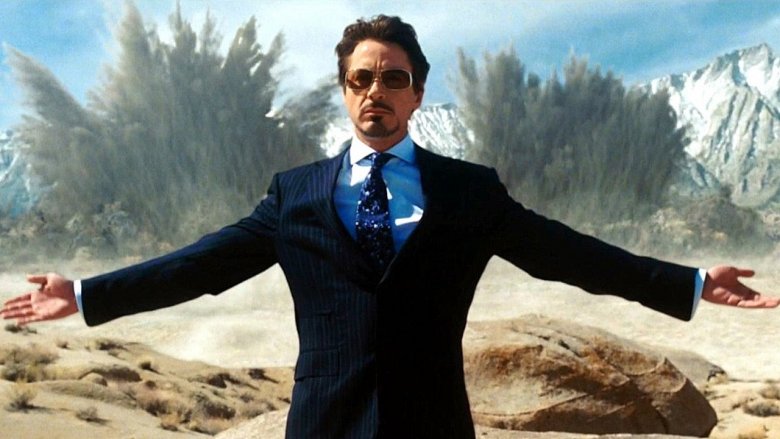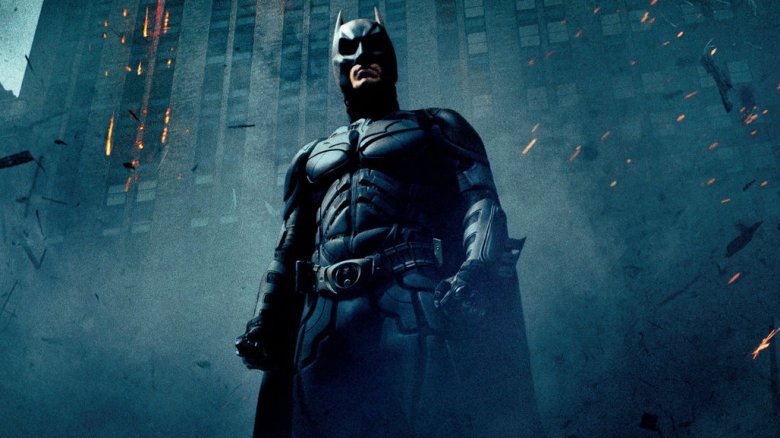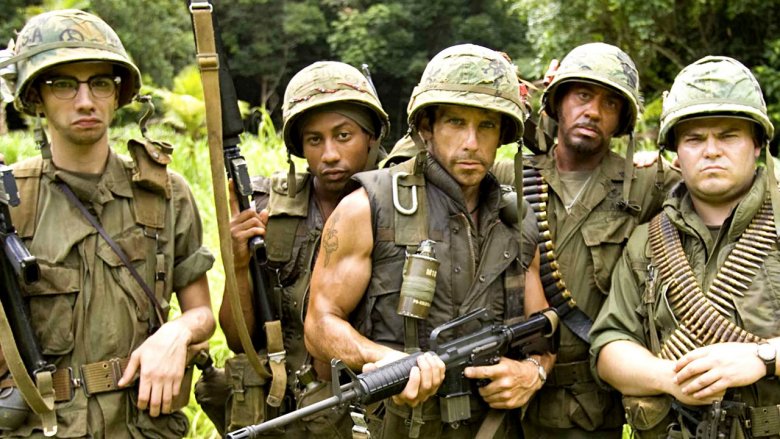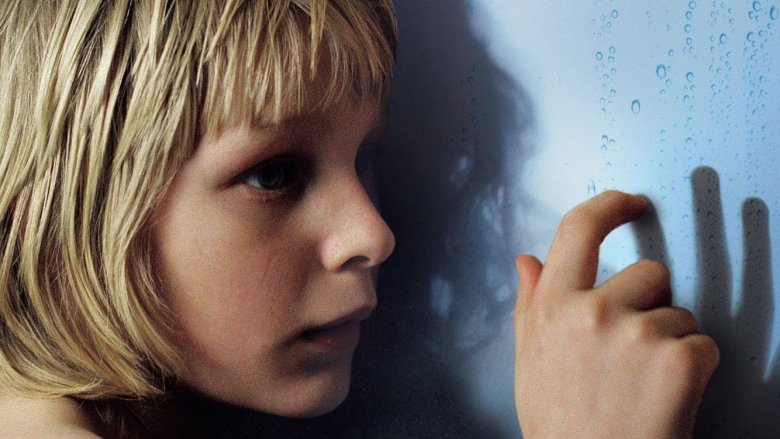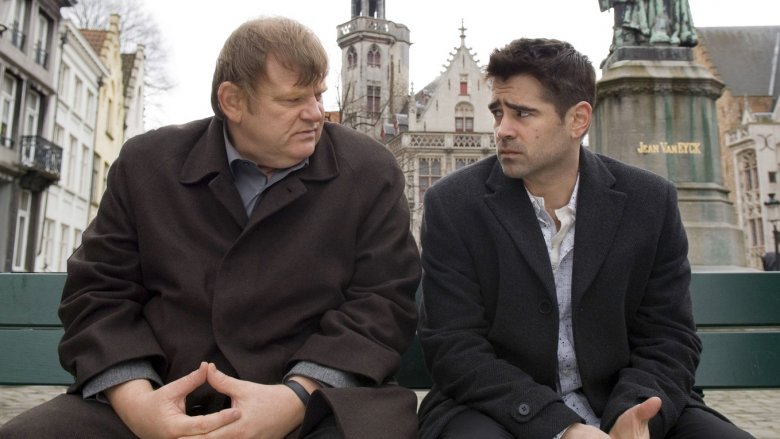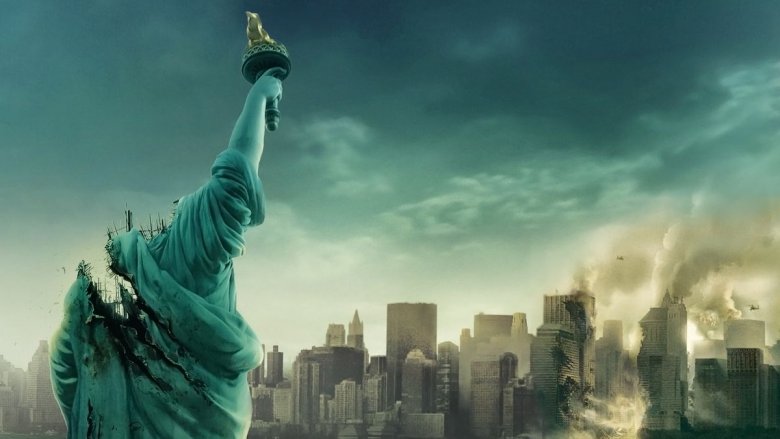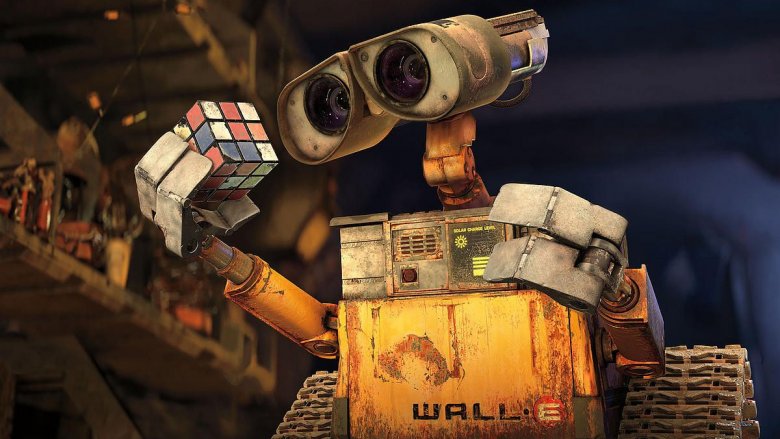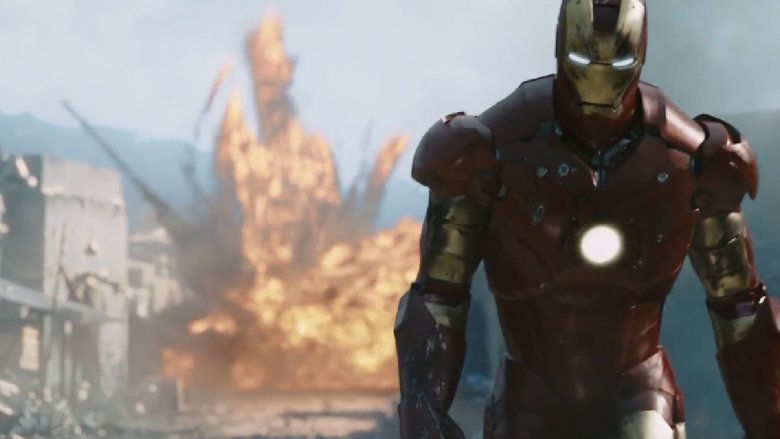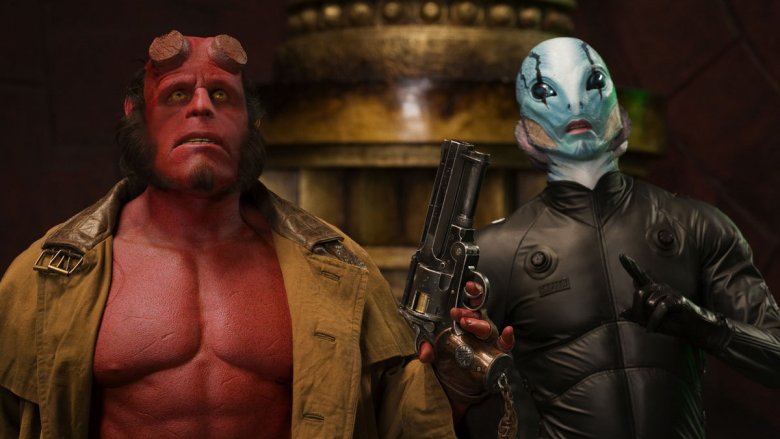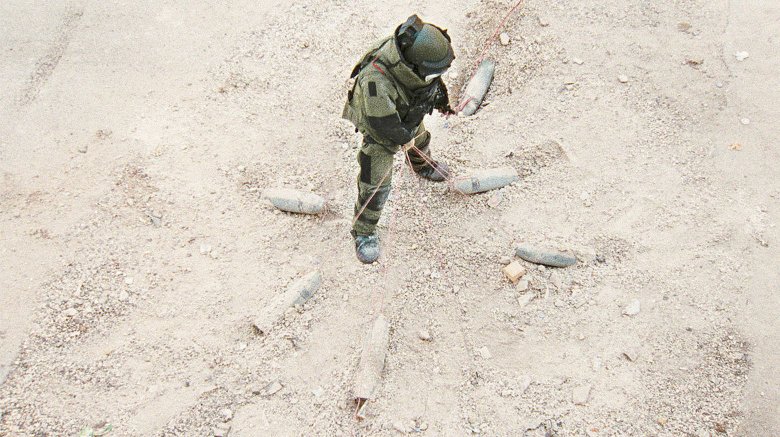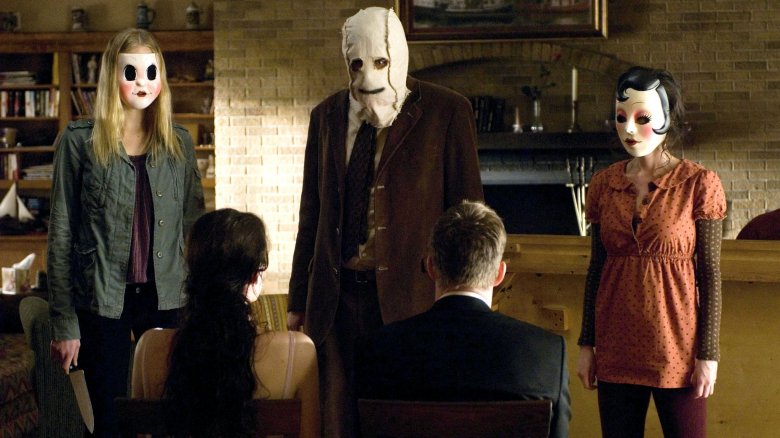Awesome Movies Turning 10 In 2018
Sometimes you can just tell when it's going to be a really good year for movies. From massive blockbusters to little-seen gems, our true film favorites often take time to grow on us, but every so often, the stars align, and the cineplex is suddenly just stuffed with releases that already feel like future classics.
A perfect case in point is 2008 — a movie year for the ages, thanks to the arrival of unforgettable additions to every genre, including a couple of monumental superhero blockbusters that would have an immense influence on some major franchises over the decade to come. We're in the midst of a pretty good year for movies right now — but while we enjoy the current glut of greatness at our neighborhood theaters, we're pausing to take a fond look back at a few awesome movies celebrating their 10th anniversary this year, and remain well worth revisiting.
The Dark Knight
There probably isn't much to say about Christopher Nolan's game-changing Batman movie that hasn't already been said, but let's start with this — the blockbuster landscape was forever altered by The Dark Knight's gritty blend of brains, action, and emotional stakes. A decade after its release, the second installment in Nolan's Batman trilogy is still widely regarded as one of the greatest superhero movies ever made.
It helps, of course, that The Dark Knight is based on one of the most beloved superheroes of all time, and features the greatest villain ever created in the Joker (brought to life with mirthful, malicious energy by the late Heath Ledger in an Oscar-winning performance), but what remains compelling about the film is that Nolan's visionary, grounded approach to the material still feels so unique: The film works just as well when viewed as a straightforward crime drama as it does a superhero adventure.
The Dark Knight redefined what a superhero movie could be. In the years since, many films have tried to duplicate its approach, but none have been able to match its white-knuckle intensity, pure popcorn entertainment, or its uncanny blend of chaos and cool. Maybe none ever will.
Tropic Thunder
Conceived as a take-no-prisoners satire of Hollywood self-importance, and featuring outlandishly hilarious performances from Ben Stiller, Jack Black, Tom Cruise, Steve Coogan, and Robert Downey Jr., Tropic Thunder is that rarest of comedies — a movie that has you laughing uncontrollably from its outrageous opening moments to its dance-tastic end credits. The moments in between see Stiller and company skillfully juggling an endless stream of slapstick physical comedy, piercing one-liners, sneeringly sardonic melodrama, and laugh-out-loud sight gags.
They do so behind a paradoxically silly setup — a Hollywood production crew out to shoot an epic war movie finds themselves trapped in an actual war zone — that somehow doesn't feel all that farfetched. In the process, they mock every Hollywood trope from insane producers to method-acting prima donnas. The film so emphatically skewers the idiocy of the blockbuster machine that it effectively killed the Hollywood satire for years. That it does so while unabashedly embracing the idiocy it mocks is what makes it genius. Now, when's that Les Grossman movie finally gonna get made?
Let the Right One In
Not only did 2008 deliver one of the greatest superhero films ever made with The Dark Knight, it also saw the release of one of the greatest vampire movies as well. Sorry, Twi-hards, we're not talking about Twilight — we're talking about Tomas Alfredson's haunting adolescent vampire drama, Let the Right One In.
Confined almost entirely to the icy, isolated confines of a Stockholm suburb, the film follows the tale of Oskar, a bullied 12-year-old who dreams of one day having his vengeance, and Eli (the mysterious girl next door. Oskar only gets to see Eli sans sunlight, she can't eat real food, and she can't enter a room unless she's been invited, so "mysterious" actually means she's a bloodthirsty vampire.
Still, for much of the meticulously paced Let the Right One In, that plot point plays second fiddle to the painful struggles of a bullied 12-year-old experiencing the desperate pangs of first love. And yes, at its heart, Alfredson's film is a first-rate romance about the things we're willing to sacrifice or forgive in the face of love. It also happens to be a heartfelt, deeply troubling, and seriously bloody vampire drama full of stunningly muted moments that sway gracefully between the sensual and the savage — essentially, everything Twilight was not.
In Bruges
While 2018 found writer/director Martin McDonagh competing for Oscar glory with Three Billboards Outside Ebbings, Missouri, it was his 2008 debut that put him on the Hollywood map. As far as first features go, you won't find many quite as assured or wildly entertaining as In Bruges.
Set in the titular Belgian city, McDonagh's film follows a pair of assassins — one of whom is beyond guilt-stricken after a tragically bungled hit — who find themselves in hiding and awaiting orders from their mobster boss. While one tries to enjoy a few quiet days, the other finds a new lease on life with a local drug dealer named Chloë.
From there, well, things get a little crazy. Just know that the film is masterfully scripted and executed by McDonagh, and it unfolds with a breezy, grounded energy that's bolstered by crackling dialogue, shocking outbursts of violence, and pitch-perfect performances by Colin Farrell, Brendan Gleeson, Ralph Fiennes, Clémence Poésy, and Ciarán Hinds (who almost steals the show in an uncredited cameo). Know as well that it's a twistedly funny little film that's capped by one of the most fabulously, heartbreakingly ambiguous endings you'll ever see. If you dug Three Billboards, you'll love In Bruges.
Cloverfield
Prior the release of Matt Reeves' Cloverfield, the found-footage genre had all but folded in on itself in the wake of one too many Blair Witch ripoffs. Leave it to J.J. Abrams' Bad Robot team to find a way to not just reinvigorate the genre, but to deliver a near generation-defining horror/sci-fi/monster movie in the process. From the moment the film's cryptic first teasers premiered, you could tell there was something special about the cryptic film buoyed by Abrams' signature "mystery box" titillation and viral marketing madness.
Those marketing ploys didn't just grab viewers' attention, they whipped them into a frenzy leading up to the film's release. Some spent months deep-diving the internet for information about Slusho!, trolling fictional MySpace pages, and wildly speculating as to what Cloverfield was actually about.
It more than lived up to the hype. The story was fantastical, yet prescient, engrossing, and emotional. The characters were fully formed and wholly relatable, the monsters were pretty damn scary, and the found-footage approach was cleverly utilized. A decade after its release, Cloverfield still feels fresh and exciting.
Wall-E
In a not-too-distant future where humanity has fled an Earth made uninhabitable by pollution, only a single Waste Allocation Load Lifter remains in service. Call him Wall-E for short. Charged with the singular purpose of cleaning up mankind's unfathomable mess, Wall-E performs its seemingly eternal task with the diligence of a robot programmed to do so.
Only there's something different about Wall-E. As the garbage bot goes about its mindless work, it collects artifacts from the civilization that left it behind; artifacts like Rubik's Cubes and VHS tapes of classic musicals once adored by Earthlings. When Wall-E uncovers proof that life may again be possible on Earth, its monotonous, lonely existence is shaken by the appearance of a sleek new robot named EVE who sweeps Wall-E off on an adventure beyond imagination that may well alter the fate of mankind.
As that adventure unfurls, Wall-E borrows inspiration from classic films like E.T. and Short Circuit (and old Hollywood musicals), and blends them with elements of hard science fiction to craft an insightful, environmentally aware adventure with wit and whimsy to burn. It manages that task with the bare minimum of dialogue, and it does so in a way that's as entertaining as it is enlightening for adults and kids alike. It's the perfect Pixar movie, and quite possibly the animation giant's best film to date — top five, at least.
Iron Man
Iron Man launched the franchise machine we now know as the MCU with the tale of how a man-child/genius/billionaire named Tony Stark came to be a metal-suited, arc-reactor powered hero. It opens with a terrifying attack in the desert and ends with one of the greatest anti-hero moments the MCU has ever delivered. Somewhere in the middle, Stark begins the long, often painful journey of learning what it means to think of someone besides yourself — a journey that's followed him through every MCU appearance he's made since.
It seems only fitting that Stark was portrayed by a once-troubled actor who'd spent a couple decades learning those lessons for himself, but it's also easy to forget Robert Downey Jr.'s Iron Man casting was a huge risk in 2008 — one that seemed even more worrisome when Marvel tapped the then largely untested Jon Favreau to direct. The pair delivered a film that worked not just as a daringly original origin story, but also a kick ass action adventure with a surprising sense of humanity. They also set Marvel Studios on a far-reaching cinematic journey that — at the time — nobody but studio execs could've imagined. Ten years later — and in the shocking wake of Infinity War — we continue to be awed by that journey, which means there's no better time to go back to where it all began.
Hellboy II: The Golden Army
Guillermo del Toro's 2004 big-screen adaptation of the tragic/heroic tale of Hellboy — one of humanity's least likely protectors — proved to be an exhilarating but often frustratingly uneven addition to the superhero genre. Still, pretty much everyone could see the potential in del Toro's gothic vision of the character's world. Everyone except Sony Pictures, that is — the studio passed on the sequel after Hellboy failed to set the box office on fire.
Luckily, Universal picked up the rights, and didn't blink at bringing del Toro back for Hellboy II: The Golden Army. That faith was more than rewarded — the sequel sees del Toro fully flesh out the wondrously unusual world of the B.P.R.D., including evil elves, bloodthirsty tooth fairies, cursed ancient artifacts, and Barry Manilow, not to mention jaw-dropping effects, inventive narrative tricks, and career-best work from Ron Perlman, Selma Blair, and Doug Jones.
Ten years after its release, Hellboy II remains one of del Toro's best films, even if it feels like not enough people have seen it. After so much time — and with a shiny new reboot on the way — it's time to finally honor Hellboy II in all its heart-wrenching, wise-cracking glory and put it on a pedestal next to its 2008 superhero counterparts. So long as that pedestal is in a deep, dark cave and guarded by the Angel of Death, of course.
The Hurt Locker
Prior to the release of her harrowing Iraq War-set thriller The Hurt Locker, Kathryn Bigelow developed a reputation for crafting morally complex dramas that explored themes of obsession, justice, and the delicate, often toxic nature of masculinity. Given that most of the director's work had come via stylish genre fare (Point Break, Strange Days, and Near Dark) and built around stories that play just barely on the right side of B-movie fare, few but her most devoted fans were aware of what a dazzling cinematic talent she'd grown into.
For that reason, The Hurt Locker felt like a bit of a revelation. The film found Bigelow taking her high-energy dramatic approach to Baghdad and into the story of a bomb disposal unit charged with ridding its deadly streets of undetonated explosives. If you couldn't tell from that description alone, The Hurt Locker is every bit the white-knuckle thriller you'd expect.
It's also rife with themes of obsession, justice, and caustic masculine energy. That energy is the driving force and the central conflict between the film's leads — Jeremy Renner as a risk-taking adrenaline junkie and Anthony Mackie as his passionate but more pragmatic subordinate — who deliver star-making turns in their pre-MCU roles. Bigelow makes the most of the moment as well, delivering a potent, politically charged, and profoundly human drama that made her the first woman to ever win the Oscar for Best Director.
The Strangers
Some horror movies get their kicks with jump scares, knife-wielding madmen, and grisly acts of violence. Others take a different approach, forgoing bloodletting in favor of building an ominous tone out of a creepy setting, a cryptic sound design, and showing viewers seriously scary things that the characters in the film are oblivious to. Bryan Bertino somehow finds a way to do all of those things simultaneously with his devastating low-budget horror classic The Strangers.
What's so scary about The Strangers? To begin with, everything. Bertino's film features an isolated country home, nihilistic, hatchet-wielding psychopaths in creepy masks, a couple of classic jump scares (not to mention one bone-chilling anti-jump scare), and, yes, grisly acts of violence. What makes The Strangers so terrifying is its patently unassuming narrative, which finds a bickering young couple being toyed with and terrorized by the aforementioned psychopaths and feels deeply real.
Bertino opens the film almost casually, flirting with the idea that The Strangers could be a romantic drama instead of an outright slasher. That idea is turned on its head with a simple knock at the door, which in turn spins one of the most horrifying home-invasion horror movies ever produced. Yes, The Strangers is creepy as hell, but never quite in the way you expect. Not until the film's ghastly final moments, that is, which are as heart-pounding as they are heartbreaking. Bertino's slow burn approach is what makes The Strangers truly special.
